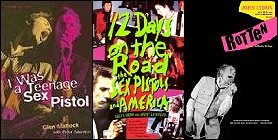
 Story: Three books tell the story of legendary punk band the Sex Pistols.
Story: Three books tell the story of legendary punk band the Sex Pistols.
Review: My fascination with the Sex Pistols began with my brother giving me the documentary The Filth and the Fury for either my birthday or Christmas one year with the cryptic words “You don’t know you want this.” He followed that up with John Lydon’s autobiography, “Rotten: No Irish, No Blacks, No Dogs”, but I just couldn’t get into it, not getting past the first few pages before I put it down. But about a year later, I acquired a different book on the Sex Pistols by their US tour manager, Noel Monk; “12 Days on the Road”, the story of the band’s raucous career-ending tour. With its much more visceral feel and crazy stories right off the bat, it was much easier to get into. So after finishing that, I went back to “Rotten” and then bought original bass player Glen Matlock’s autobiography “I Was a Teenage Sex Pistol”. Three very different perspectives on the story of the band lead to three very different books. Ultimately, they compliment each other, helping to give a more rounded view than any one book would have done alone.
First, there is “12 Days on the Road”. This is clearly the loosest and least well “put together” of the three. Noel Monk is not a writer and the help of collaborator Jimmy Guterman does little to change that. But given the chaotic nature of that infamous tour, it’s in perfect keeping with the subject matter. Noel’s stories are raw, harsh and seemingly unaffected by what others might think about them. He isn’t trying to give a balanced view of things, only his own. And he has plenty of things to talk about, from the normal day-to-day activities of a major tour, to trying to keep track of Sid Vicious as he rebelled against the band, being controlled and…well…just about everything. This one is the view of an outsider who, nonetheless, had intimate dealings with the band and an inside view of goings-on late in the band’s original run.
“Rotten”, on the other hand, is John “Johnny Rotten” Lydon’s personal story. It isn’t confined to the era of the Sex Pistols, but covers much of his life. Lydon also goes maybe a bit too far in trying to create a balanced view of that life, not only going into great detail with his own account, but has opened things up to others, as well. There are frequent breaks for quotes or commentary from the people involved. He even goes so far as to turn whole chapters over to other people or to conversations between himself and others. This gives “Rotten” a bit of the feel of a documentary and less that of a true autobiography. But, ultimately, it is Lydon’s story and his view of things takes precedence. This one is key for understanding where Lydon’s mind was at the key moments in the band and his careers.
Then there’s “I Was a Teenage Sex Pistol”, the last one I read, but the first one written. The style of “Teenage Sex Pistol” is much more like a traditional celebrity autobiography. It has a lot of information, but an informal tone. One gets the sense that Glen Matlock’s co-author, Peter Silverton, did little but organize Glen’s actual words into a cohesive narrative. This one stands out because of its position as Matlock’s official declaration of his place in Pistols history. For many years, Matlock was the forgotten Sex Pistol, all but cut out of the band’s history. So when Matlock first wrote “Teenage Sex Pistol” it was with a definite agenda. That agenda definitely comes through, but with no sense of malice; he just seems to be trying to set the record straight. Of course, The Filth and the Fury and the recent reunion tours have probably cemented him in the public eye as a “true” Sex Pistol better than this book did. Still, it has lots of interesting stories (including some that Lydon and company would not have been privy to) and is the only one of the three to cover the reunions, which it does in two addendums to the original text.
When you try to understand the history of any artistic collaboration (such as a band), it is necessary to see things from many different points of view. Finding one, definitive perspective is unlikely. So reading multiple books, each dedicated to a specific point of view, is a good way to go. I certainly felt that I understood the story of the Sex Pistols better than I had before. Lydon tries to provide multiple points of view, but as he chose the guest voices and even participates in some discussions, it is still driven by his own perspective. So if you are interested in the Sex Pistols, I can endorse all three of these books and would suggest you read as many of them as you can. If you just want one, the closest to a balanced view is “Rotten”, but you still won’t be getting the whole story.
“I Was a Teenage Sex Pistol”
Year: 1991, revised 1997, 2007
Author: Glen Matlock with Peter Silverton
Publisher: Reynolds & Hearn
Pages: 286“12 Days on the Road”
Year: 1992
Author: Noel E. Monk and Jimmy Guterman
Publisher: Harper
Pages: 240“Rotten: No Irish, No Blacks, No Dogs”
Year: 1995
Author: John Lydon with Keith and Kent Zimmerman
Publisher: Picador
Pages: 352